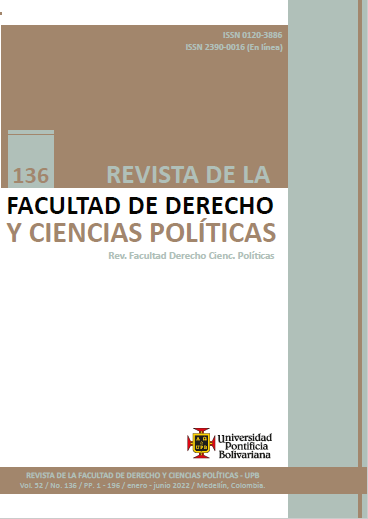CrowdLaw y democracia deliberativa: reflexiones sobre la legitimación democrática de las decisiones públicas mediante las nuevas tecnologías
Contenido principal del artículo
Resumen
CrowdLaw surge en los últimos años como una propuesta basada en la aplicación de una serie de métodos y herramientas que utilizan como base las nuevas tecnologías para generar una interacción entre los ciudadanos y las instituciones públicas en los procesos de toma de decisiones políticas. Se plantea como hipótesis que esta particular propuesta de participación ciudadana en la toma de decisiones políticas tiene el potencial de satisfacer las condiciones que propone la democracia deliberativa para legitimar las decisiones políticas. Sin embargo, su éxito en dichos términos solo podrá suceder si viene acompañado de un proceso de derrumbamiento de la brecha y la desigualdad digital, como se produce en el caso del acceso al Internet.
Citas
Aitamurto, T. (2015). Crowdsourcing as a Knowledge-Search Method in Digital Journalism. Digital Journalism, 4(2), 280-297. doi:10.1080/21670811.2015.1034807
Aitamurto, T. y Landemore, H. (2015). Five design principles for crowdsourced policymaking: Assessing the case of crowdsourced off-road traffic law in Finland. Journal Social Media for Organizations, 2(1), 1-19.
Aitamurto, T. y Landemore, H. (2016). Crowdsourced Deliberation: The Case of the Law onOff-Road Traffic in Finland. Policy & Internet, 8(2), 174-196.
Alsina, V. y Martí, J. L. (2018). The Birth of the CrowdLaw Movement: Tech-Based Citizen Participation, Legitimacy and the Quality of Lawmaking. Analyse & Kritik, 40(2), 337–358.
Asamblea General de la ONU. (2011). Informe del Relator Especial sobre la promoción y protección del derecho a la libertad de opinión y expresión Frank Le Rue. A/ HRC/17/27.
Beetham, D. (1991). The Legitimation of Power. Palgrave.
Bohman, J. (2016). La madurez de la democracia deliberativa. Co-herencia, 13(24), 105- 143.
Brabham, D. C. (2013). Crowdsourcing. MIT Press.
Brito, J. (2008). Hack, Mash y Peer. Crowdsourcing Government Transparency. The Columbia Science and Technology Law Review, 119(9), 119-157.
Buchanan, A. (2002). Political Legitimacy and Democracy. Ethics, 112(4), 689-719.
Christiano, T. (1996). The Rule of the Many. Westview Press.
Cohen, J. (1997). “Procedure and Substance in Deliberative Democracy”. In J. Bohman, & W. Rehg, Deliberative Democracy: Essays on Reason and Politics (pp. 407-438). The Massachusetts institute of Technology Press.
Dahlberg, L. (2007). The Internet, deliberative democracy, and power: Radicalizing the public sphere. International Journal of Media & Cultural Politics, 3(1), 47-64.
De Moraes, A. (2019). Assessing the Effects of CrowdLaw Initiatives: Experiences from Latin America. In 2019 Sixth International Conference on eDemocracy & eGovernment (ICEDEG), 365-366.
Elster, J. (1998). Deliberative democracy. Cambridge: Cambridge University Press.
Ess, C. (2018). Democracy and the Internet: A retrospective. Javnost, 25(1-2), 93-101.
Ercan, S. A., Hendriks, C. M., & Dryzek, J. S. (2019). Public deliberation in an era of communicative plenty. Policy & politics, 47(1), 19-36.
Fishkin, J. S., Senges, M., Donahoe, E., Diamond, L., y Siu, A. (2018). Deliberative polling for multistakeholder Internet governance: considered judgments on access for the next billion. Information, Communication & Society, 21(11), 1541-1554.
Garnelo, M. (2019). Measuring CrowdLaw: Developing Indicators to Measure the Impact of Participatory Processes on the Quality of Policy-making in Madrid (Doctoral dissertation, Harvard University).
Gimmler, A. (2001). Deliberative democracy, the public sphere and the Internet. Philosophy & Social Criticism, 27(4), 21-39.
Giuffré, C. I. (2018). Democracia deliberativa y surgimiento del constitucionalismo dialógico. Ética y Discurso, 1(3), 35-60.
GovLab. (2018). CrowdLaw Manifesto. Recuperado el 04 de marzo de.2020 de: https:// manifesto.crowd.law/es/
GovLab. (2018). Catalog. Recuperado el 04 de marzo de 2020 de: https://catalog.crowd. law/index.html
GovLab. (2018). About CrowdLaw. Recuperado el 04 de marzo de 2020 de: https:// catalog.crowd.law/about.html
Gutmann, A. y Thompson, D. F. (2004). Why deliberative democracy? Princeton University Press.
Hopenhayn, M. (2006). Desigualdades Sociales y Derechos Humanos: Hacia un pacto de Protección Social. Reunión de Expertos sobre Población, Desigualdades y Derechos Humanos. CEPAL. Recuperado el 04 de marzo de 2020 de: https://www.cepal.org/sites/default/files/events/files/hopenhaynm.pdf
Internet World Stats. (2020, marzo 03). Internet World Penetration Rates by Geographic Regions - 2020 Q1. Retrieved from Internet World Stats: https://www. Internetworldstats.com/stats.htm#links
Kittur, A., Chi, E. H. y Suh, B. (2008). Crowdsourcing user studies with Mechanical Turk. Proceedings of the SIGCHI Conference on Human Factors in Computing Systems (p. 453-456). ACM.
Klein, M. (2011). How to Harvest Collective Wisdom for Complex Problems: An Introduction to the MIT Deliberatorium. MIT Center for Collective Intelligence.
Landemore, H. (2020). Open Democracy: Reinventing Popular Rule for the Twenty-First Century. Princeton University Press.
Levy, P. (2004). Inteligencia colectiva: por una antropología del ciberespacio. Biblioteca virtual en salud.
McKay, S. y Tenove, C. (2020). Disinformation as a threat to deliberative democracy. Political Research Quarterly, 73.
Martí, J. L. (2011). La paradoja de las precondiciones de la democracia deliberativa en Nino. In L. Garíca-Jaramillo, La democracia deliberativa a debate (p. 41-54). Universidad EAFIT.
Meier, P. (2011). Do ‘Liberation Technologies’ Change the Balance of Power between Repressive States and Civil Society? University of Medford, Fletcher School of Law and Diplomacy. University of Medford.
Nino, C. S. (1996). La constitución de la democracia deliberativa. Barcelona: Gedisa.
Noveck, B. S. (2018). CrowdLaw: Collective Intelligence and Lawmaking. Analyse & Kritik, 40(2), 359–380.
Rawls, J. (1993). Political Liberalism. Columbia University Press.
Rosgaby Medina, K. (2020). Estadísticas de la situación digital de Colombia en el 2019 y 2020. Recuperado el 04 de marzo de 2020 de: https://branch.com.co/marketing-digital/estadisticas-de-la-situacion-digital-de-colombia-en-el-2019-y-2020/
Sgueo, G. (2020). Using Technology to ‘Co-Create’EU Policies. European Parliamentary Research Service. Recuperado el 04 de marzo de 2020 de: https://ssrn.com/abstract=3521764
Tello Arista, I. (2016). Measuring CrowdLaw: Developing Indicators Improving Policy Legitimacy through Crowdsourcing Legislation (Master’s dissertation, New York University). http://ecas.issuelab.org/resources/29679/29679.pdf
Thompson, D. (2019). Teoría democrática deliberativa y ciencia política empírica. Estudios Políticos (Universidad de Antioquia)(56), 270–313.
Unión Internacional de Telecomunicaciones. (2020). Inclusión digital para todos. Recuperado el 04 de marzo de 2020 de: https://www.itu.int/es/mediacentre/backgrounders/Pages/digital-inclusion-of-all.aspx
Waldron, J. (2005). Derecho y Desacuerdos. Marcial Pons.
Weber, M. (1964). The Theory of Social and Economic Organization. Michigan: Talcott Parsons, Free Press.
Witschge, T. (2004). Online deliberation: Possibilities of the Internet for deliberative democracy. Democracy online: The prospects for political renewal through the Internet, 109-122.


